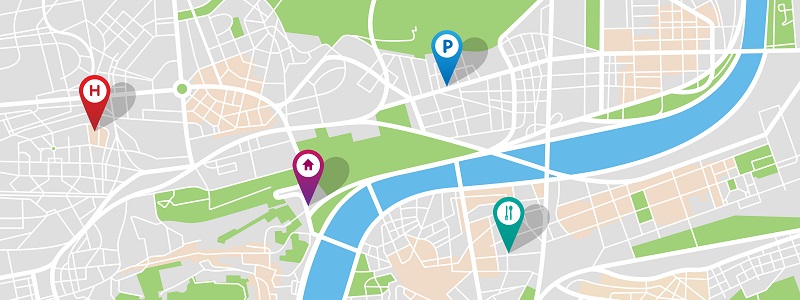The travel and tourism industry has long been a major staple of economic activity and growth in the USA. However, the COVID-19 pandemic has had a significant impact on the industry. The industry accounted for 2.9% of U.S. GDP in 2019, totaling about $1.9 trillion.
In 2020, this economic share dropped significantly because of the COVID-19 pandemic.
Because of this decline, companies in the travel and tourism industry are reviewing how they operate and market their business. A major part of this is leveraging market data to make informed decisions and lead to new opportunities now and in the future.
1. Travelers Can Get More Information Pre-Trip Than Ever Before
Modern tourists and travelers have greatly expanded access to destination information than ever before. With a simple Google search using terms like “Things to do in…” from their smartphone’s web browser, they can instantly find a list of highly-rated businesses and activities to do in their destination—or use that to plan out where they want to go in the first place.
In the past, TripAdvisor used to rule the landscape of travel commentary and reviews. Today, Google has turned into a goliath of travel-related information, rich with reviews from Google users, reviews of businesses in the area, and even the ability to book a flight from the search engine.
Airbnb, Hostelworld, and even Foursquare have revamped the travel review landscape as well. These companies have carved out specialized niches in the travel sector by targeting hosted bed-and-breakfasts, hostels, and local businesses, respectively.
Even beyond these companies, there is a litany of individual travel influencers, bloggers, and YouTubers who can command their own unique followings looking for travel information.
In fact, as part of our recent proprietary research into generational shopping habits, we discovered that Gen Z in particular leads their shopping path and is heavily influenced by search engines, online reviews, YouTube, and social media when gathering information. Top information sources emerge as:
- Search engines (55%)
- Online reviews (52%)
- YouTube (47%)
- Social media (35%)
These four areas are distinct to Gen Z when it comes to information-seeking, and they underline the important fact that this generation does its research elsewhere before making a purchase from a company.
In terms of travel, this applies across the board. If a member of Gen Z wants to schedule a trip themselves, you can be sure that they’ll do their research online, look for third-party opinions, and seek online reviews.
Even if someone in Gen Z uses a travel agent to create an itinerary, their preferences indicate that they’ll first look through these digital resources to find one that works for them prior to reaching out to consider a purchase.
Whether it’s for business or leisure, discovering what influences travel decisions and where they go to make travel decisions, allows brands to connect more effectively.
2. You Can Earn a Strategic Advantage over Competitors
With a suddenly shrunken market, competition over the percentage of travelers and tourists will be greatly increased. Many of your competitors in the industry will be just as hard-pressed to attract and retain customers as you are. In lean times, it’s important to have every possible competitive advantage.
Having a more accurate picture of what your travel and tourism customers want and need from in-depth market research can help you create better marketing and service offerings that address their needs and wants more effectively than your competitors. This can be an enormous competitive advantage for attracting and retaining a limited customer pool.
As our own proprietary research has shown, people in general are becoming more open to the notion of travel in the wake of COVID-19. By understanding these individuals — in addition to the ways that their lives have been shaped — it’s possible for brands to strategically expand their customer base.
The method of doing this is simple: Hear what your customers want and offer it to the best of your company’s ability. When major fluctuations happen in any market, including travel, the brands that can best adapt to changing circumstances are the ones who have the most opportunity to thrive.
So as COVID-19 restrictions finally fall away and the world feels generally more at ease with traveling again, brands get to make the choice of how they adapt to these changing circumstances.
After all, only 4% of travelers believe that their “best years” are behind them. That leaves 96% who are ready to make memories and live life to the fullest by traveling.
3. You Can Minimize Costly Errors
We’ve all seen at least one marketing campaign, product, or service that made us think “what were they thinking when they wasted money on THAT?” Insufficient market research in any industry can lead to less effective decisions and wasteful spending on activities that won’t provide a measurable return on investment (ROI).
Comprehensive research (and especially focus group testing) can help identify consumer sentiments towards particular products, services, and marketing messages. This, in turn, can help identify potentially problematic items before they’re put in front of the mass market and create a “what were they thinking?” response from consumers.
There may not be a better example of this happening than during the beginning and the height of the COVID-19 pandemic.
During this time, the mantra of “social distancing” became ubiquitous across the world as a way to help minimize and prevent transmission of the COVID-19 pathogen.
The term and its impact were seen throughout the corporate world, including in advertising.
However, one travel company lagged behind.
This company launched a new ad campaign complete with their corporate mascot. The idea of the campaign is that the mascot would be doing things considered to be faux pas in traveling, like being uncomfortably close to fellow plane passengers or helping yourself to a neighbor’s snacks.
In a time when COVID-19 didn’t exist, this had the chance to be a funny, light-hearted campaign.
But during COVID-19, viewers didn’t see a funny take on the pain points of commercial flights — they saw a company ignoring the social rules of the new normal.
The backlash wasn’t necessarily severe, but the travel company got so much feedback that they quickly pulled the campaign and replaced it.
This time, they featured the same corporate mascot again — but he wasn’t on a plane.
Instead, he was sitting in a chair, applying hand sanitizer, and eating a bowl of his own popcorn (as opposed to someone else’s pretzels).
A message on the commercial said that the mascot would be “social distancing for a while” and encouraged viewers to stay home, which was a bold statement at the time considering that this company made money based on travel bookings.
But for the company itself, earning the good will of their potential customers was more important than making a buck during the global pandemic.
They corrected their action, and as the world returns to something resembling normal today, they continue to do business with eager travelers.
The moral of this company’s story is clear. It’s crucial to “read the room” when it comes to launching ad campaigns, particularly those centered around humor, prior to launching. So much can change in so little time that yesterday’s lucrative TV commercial could be tomorrow’s foot in the mouth.
4. The Pandemic Has Changed the Industry
For better or worse, all of your brand and market research from before the pandemic is no longer an accurate reflection of the current state of the industry. COVID’s economic impact on the industry is clear — a 73% drop in global tourism in 2020 and 1 billion fewer travelers compared to 2019.
Even though tourism and travel is potentially on the road to recovery following the introduction of the COVID vaccine and the lifting of emergency restrictions and “stay at home” orders, businesses will need to account for new priorities for health, safety, and sanitation held by tourists and travelers.
Understanding what travelers expect to maintain their health and safety must be front and center. Whether it is for work or play, messaging should provide comfort, safety and trust to deliver on the best brand experience and encourage future travel.
To influence that messaging, it’s important to understand the exact feelings that consumers have toward travel right now.
Our Q1 2022 Consumer Sentiment Study found 30% of travelers say we all have to learn to adapt to new travel protocols to be safe. Conversely, 23% of travelers say they don’t know when they’ll feel confident in making travel plans again.
As Q2 2022 begins, 360 Market Reach (now Leger) will also study and publish whether this sentiment has shifted.
Are You Up to Speed on the Latest Travel Trends?
With the travel industry continuing to change and adapt to the demands of consumers, it’s never been more important to understand travelers, what they want, and what they expect.
We’re here to help. Our team of industry researcher experts can work with your company to understand what you want to accomplish and establish testing so that you can get the actionable data you need to make an informed decision.
Are you ready to get started?



